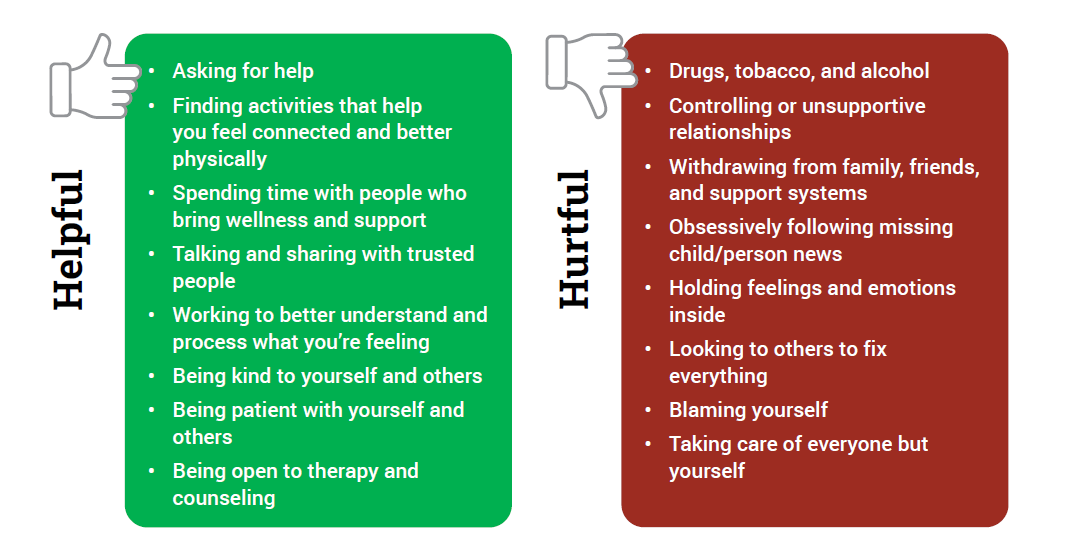While nothing will ever be the same, opportunities for “a new normal” are possible. Taking care of your mental health will help you and your family move forward in this journey.
From the moment your brother or sister is missing, your life—and your family’s life— changes. Nothing will ever be the same again. Many of the things that felt like a part of “normal” everyday life may feel different now.

Just sitting at the dinner table may feel uncomfortable because you’re so aware of an empty chair. Going to school may feel awkward and isolating because suddenly your friends aren’t sure what to say to you—and you’re not sure how to talk to them either. With law enforcement and the media coming in and out of your home at times, it can feel like you can’t even relax on your own furniture, in your own spaces, because your parents may be answering officers’ questions or doing a news interview.
Your world has been turned upside down, and you may feel like you’re in limbo. You may feel “on edge,” and seem to stay that way, because you’re constantly waiting for the next piece of news about your brother or sister or for them to come home. When a sibling is missing, how can life ever feel normal again?
It may not ever feel “normal” in the way it did before; at least not completely. But over time, your life will take on new rhythms and routines. You may grow more accustomed to the changes that at first seemed so strange, frightening, or upsetting. A “new normal,” although different than before, can begin to feel more familiar.
“There will always be a ‘before’ what happened and an ‘after.’” —Carmen
“As time went on, we gradually attempted to redefine ourselves both as individuals and as a family. Each of us has done this at different times and in different ways. It is a continuous process that has continued to be a daily struggle.” —Amy
“I would try to put it behind me. I just wanted to be a kid again.” —Trevor
“In this situation, it’s normal not to feel ‘normal!’” —Martha
“The truth is I am not different. I am just going through something very difficult.” —Cory

There are things you can do to help yourself find comfort zones amid all the chaos. Doing positive things can help you to restore some balance in your life and regain a sense of steadiness from day to day. Here are some things to try. You may notice a lot of similarity with the suggestions earlier in this Guide, and that’s good! It’s always helpful to see and think about these important strategies again.
- Try some physical activity. Run, swim, join or reconnect with a sports team, lift weights, or dance. Do something to take care of yourself physically.
- Center, calm, and focus yourself with mental activity. Concentrate on schoolwork, read, do a crossword puzzle or sudoku, or try a relaxation or meditation app.
- Express yourself through art. Draw, paint, work with clay, knit, do beadwork, design clothes, make jewelry, listen to music, play a musical instrument, create video/film projects, or try cooking and baking.
- Write. You can keep a journal, write short stories, a novel, or poetry.
- Talk. What matters is that you find someone to talk to that you trust, whether it’s an adult or a friend your age. Connect with someone who you’re comfortable with and who is not judgmental; a friend, relative, teacher, coach, therapist, godparent, or someone who can offer you religious or spiritual counsel if you desire that.

- Volunteer. Volunteer for a cause that has personal meaning for you, such as a missing children’s organization, an animal rights group, or a tutoring program.
- Care for animals. Pets can love you unconditionally, make wonderful companions, and are always there to hold and hug. If your parents say this isn’t the time to bring home an animal, you may be able to walk or help walk dogs in your neighborhood or volunteer at an animal shelter.
Even if life doesn’t feel the same again, it’s important to live your life in a way that’s good and healthy for young people of your age. Try not to retreat from life or to put everything “on hold” until your sibling returns. Hold tight to friends and the things that make you feel safe, sound, and better. Remember, your feelings are real and okay to experience, so let yourself laugh, cry, and be angry when you need to. 
Routines can give your life some much-needed structure, so use school, work, sports, clubs, and other activities to give your day routine, familiarity, and meaning. Try to stay positive, even when life feels unfair.
It’s easy to slip into negative routines and activities, and sometimes we can miss noticing that it’s happening. Look at the lists above again, which offer a side-by-side view of things that can be helpful and those which are hurtful—and can actually worsen and prolong many of the difficulties you’re facing. And as you read these, understand that each of us, in some way and at some point during our journeys, experienced the hurt of decisions or actions that didn’t serve us. We are human beings going through an unthinkable situation; and thankfully, we’ve learned to give ourselves forgiveness and grace as we’ve navigated back to better decisions. We want that for you, too.
A Note on Counseling and Therapy
It is okay not to be ready for therapy. And it’s also important to figure out why you are not ready—and be open to noticing when you are. It takes strength and courage to begin counseling or therapy. Remember, there should never be any embarrassment, shame, or stigma attached to talking with a trained professional about what you are going through. This is a safe place to share your feelings and cope. As a matter of fact, all of us who have worked on this Guide agree: we all found therapy to be one of our most important and healing places. So be open to it, be patient with the process, and if you feel that the therapist or counselor you work with is not a good fit for you or is not helping, it’s okay to look for a new helping professional.

